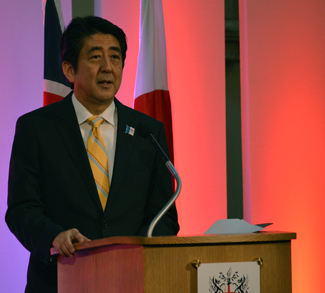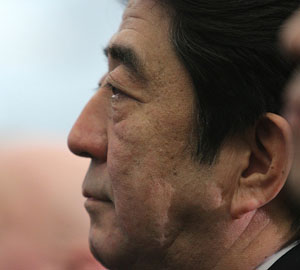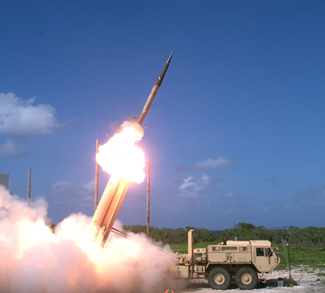Against a backdrop of protests on the streets of Tokyo and in the embassies of various East Asian nations, Prime Minister Shinzo Abe has taken a big step towards Japan’s “normalization” in international relations. It took hundreds of hours of debate and even a few scuffles on the floor of parliament, but his landmark security law has passed and Japanese forces can now be deployed overseas for the first time since World War II.
The law establishes three specific preconditions for such a deployment to take place: (1) in the event of an attack on Japan or its close ally that threatens Japan’s survival and poses a danger to its people; (2) when there are no other appropriate means available to repel the attack and ensure the survival and protection of Japan’s people; and (3) the use of force must be kept to a necessary minimum.
The opposition’s main contention with these three preconditions is immediately evident: they’re incredibly vague. In particular, one could imagine the need to “protect Japan’s people from danger” being stretched to cover terrorism or even hypothetical threats that may arise in the future – the now familiar concept of a pre-emptive war.
But these are considerations for the distant future. Pacifism runs deep in Japan, having served as one of the main pillars of its post-war constitution for 70 years. Its legacy is apparent in the protests surrounding the security law’s passage last week and the drawn out legal challenges that are sure to follow. If Abe’s endgame is in fact a constitutional amendment and a sea change in how the Japanese people view their country, it’s going to be a long and contentious process, and no one knows that more than he does.
In this sense, the law may have glided comfortably through parliament on the wings of the Liberal Democratic Party’s large majority, but it is just an opening volley in a much wider struggle to define the very essence of modern Japan. The next big “X” on the combatants’ calendars will be upcoming upper house elections in 2016, when opposition groups will make a stand against Abe’s reinterpretation at the ballot box.
Those inclined towards skepticism could be forgiven for wondering whether the law was set up to fail a legal challenge on its constitutionality. This would frame the constitution itself as the problem, allowing Abe to target the golden goose of his rehabilitation project: an amendment of Article 9 of the Japanese constitution, which foregoes war as a tool for settling international disputes. Either way it’s possible that we’ll see a constitutional amendment appear as a central issue in next year’s elections.
A Game-changer in East Asia?
It’s obvious at this point that Prime Minister Abe is willing to stake a great deal of his own political capital on “rehabilitating” Japan as a normal international actor, one that participates in peacekeeping operations and pursues its own national interests with a full political and military toolbox. He envisions a Japan that is able to take a more assertive role in regional security matters such as the ongoing dispute in the South China Sea. Some countries like the Philippines, Australia, India, and even Vietnam would welcome Japan’s entry into the dispute because it would serve as a balance against China and add a powerful proponent of a multilateral solution (as opposed to Beijing’s preferred bilateral approach). The new law would also allow for closer military cooperation with India, another country that is worried about China’s growing military clout.
For those wondering how the new law would justify such a deployment, here’s a little taste of the semantic gymnastics coming soon to the floor of the Diet: Japan is an island, sea-faring nation that depends on the free flow of trade for its very survival. A small deterrent force would be the minimum response required to guarantee this free flow of strategic imports such as oil, food, etc. And voila, Japan can dive headfirst into tumultuous waters of the South China Sea.
Another key impact of the law pertains to the US-Japan security treaty. Tokyo’s response to the growing Chinese military footprint in the region has been to go all-in with Washington to ensure its security. In this the law is just a reflection of the shifting military balance in the region: before the US qualitative military advantage was so vast that it could guarantee Japan’s defense without incurring catastrophic costs; now the playing field is more level and allies are being asked to contribute more to their own security. This phenomenon is not limited to US-Japan relations. It’s playing out throughout the post-Cold War “hub-spoke” alliance system as it transitions towards the “networked alliance” approach of multilateral security.
In other words, it’s no longer a one-sided relationship where it is only the United States’ job to offer assistance to Japan. The new law foresees scenarios like US forces in Guam coming under attack which, though not occurring on Japanese territory, would still have direct repercussions on Japan’s security. It’s also a situation where Japanese military support – based as it is far more proximate to Guam than US assets that are further afield – could have a timely and decisive impact on the outcome of the fight.
There is of course an economic element to Japan’s rehabilitation as well. A previous ban on the export of military technology was relaxed in April, freeing the way for Japan’s entry into international arms markets. Though Tokyo has only sold missile parts to the United States so far, it’s only a matter of time until it secures a larger contract for one of Japan’s more advanced weapon platforms.
Regional Response
The regional response to the security bill has been predictable. The most vocal detractor has been China, a country that bore the brunt of Japan’s aggression in World War II. The Chinese defense ministry released a statement saying Japan should learn the “profound lessons from history” and the talking points are portraying Tokyo as a disruptive interloper in the South China Sea. There are two lenses through which to view Beijing’s protests. First the historical one, which views the new security law as a dangerous step from an unrepentant Japan towards militarization and renewed aggression in East Asia. This is more a case of playing to the nationalist base than voicing an existential threat given Japan’s current budgetary and demographic constraints. Then there are the more tangible consequences of further complicating China’s consolidation of the South China Sea and increasing the early survivability of US forces in the event of a conflict – these are real reasons why Beijing prefers a pacifist neighbor.
South Korea, another victim of Japanese war-time aggression, issued a statement urging Japan to abide by the spirit of its post-war constitution and pursue a transparent defense policy that contributes to regional peace and security.
The Philippines issued a positive statement in one case of immediate geopolitical considerations trumping Japan’s wartime legacy. Relations between the two countries have been warming over the past few years, and Manila needs all of the outside help it can get in its territorial dispute with Beijing over shoals in the South China Sea.
Vietnam is another country that would welcome any Japanese foray into the South China Sea dispute. Japan-Vietnamese relations have also been improving steadily due to a convergence of interests on many fronts: security, technology, aid, and investment to name a few. Vietnamese Communist Party Secretary Nguyen Phu Trong recently visited Japan in a trip that saw a flurry of new announcements, including a Japanese pledge of $832 million in infrastructure aid and new ships for Vietnam’s coast guard.
Abe’s Japan is already very different from the one he inherited in 2012, and his path to normalization will continue to ripple through an East Asia security landscape that is already in flux. But Abe can’t celebrate yet. Pacifism runs much deeper than the law’s easy passage would suggest, and the fight for Japan’s soul might only be getting started.




